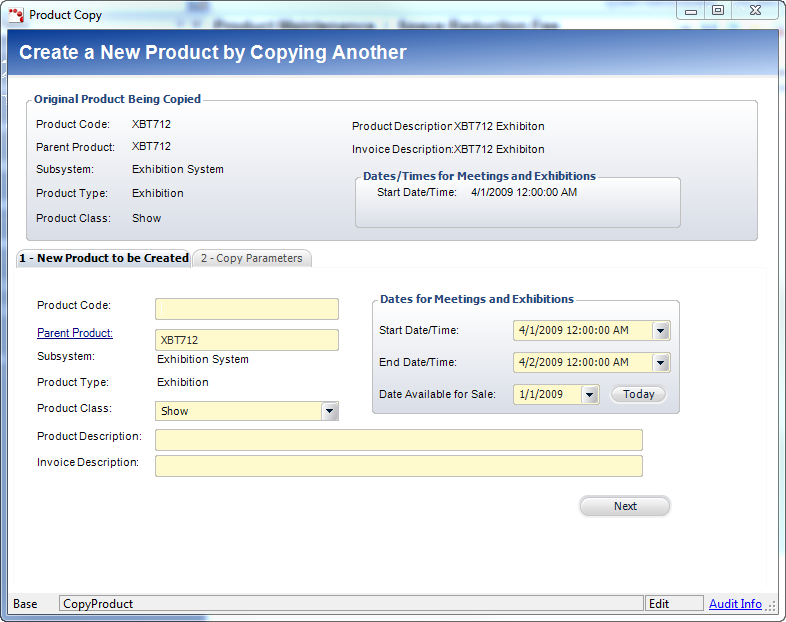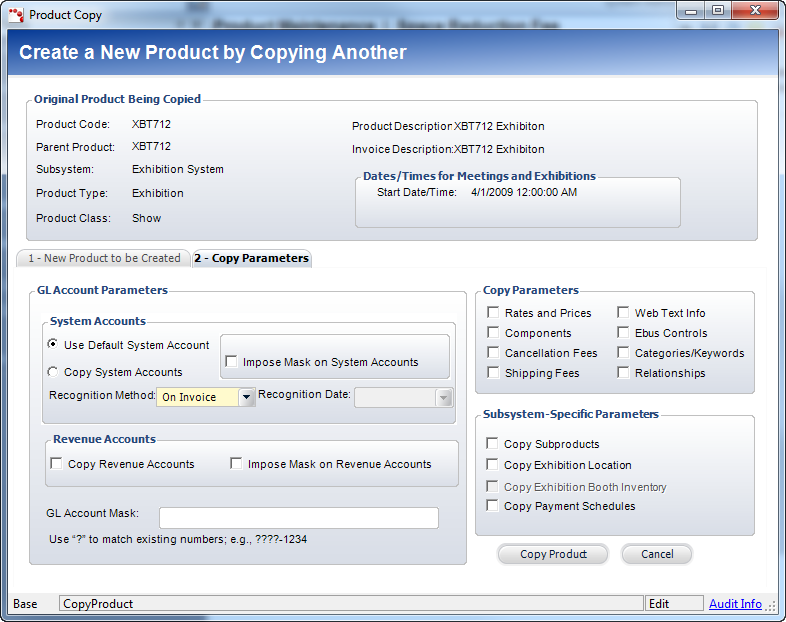 The
only value that must be new is the Product Code.
The
only value that must be new is the Product Code.
If you need to create multiple exhibition products that have similar setups, Personify offers a Copy Product functionality to make this process easier and less time-consuming. The Copy Product functionality allows you to take the setup of an existing inventoried product and copy over any or all of its parameters, including GL accounts and pricing setups, by simply checking off the parameters you want to recreate for the copied product.
This functionality is available for all Product Types and appears as a task (Copy this Product) through the Related Tasks taskbar when viewing a product on its Product Maintenance (PRODUCTCENTRAL) screen.
The Copy Product screen consists of two tabs:
· 1 – New Product to be Created
Used to set up the general product information, such as Product Code and
Product Description.
· 2 – Copy Parameters
Used to define the parameters that should be copied from the old product
to the new product.
The Copy Parameters functionality allows you to copy any or all parameters
of a product including the following:
o GL Account Parameters
§ System Accounts
§ Revenue Accounts
o General Parameters
§ Rates and Prices
§ Components
§ Cancellation Fees
§ Web Text Info
§ Shipping Fees
o Subsystem-Specific Parameters
§ Subproducts
§ Exhibition Location
§ Exhibition Booth Inventory (where applicable)
 The
only value that must be new is the Product Code.
The
only value that must be new is the Product Code.
To create a new product by copying an existing:
1. Once the original product is set up on the Product
Maintenance screen, click Copy this Product
from the Related Tasks task category.
The Product Copy screen displays with information on the original product
appearing at the top of the screen, as shown below.

2. On the New Product to be Created tab, enter the Product Code of the new product.
 The
Product Code MUST be different from the original product.
The
Product Code MUST be different from the original product.
3. If
necessary, select a new Parent Product.
This value defaults from the original product, but may be changed as needed.
4. Select
the Product Class of the
new product.
This value defaults from the original product, but may be changed as needed.
5. Enter the Product Description and Invoice Description.
6. If
necessary, modify the Start Date/Time,
End Date/Time, and Date
Available for Sale.
These values defaults from the original product, but may be changed as
needed.
 As
of 7.4.2, when copying an exhibit product, for the first pricing record
for each rate structure, the system will set the price Begin Date to be
the Available Date plus the time between the source exhibit product Available
Date and pricing Begin Date of first pricing record for that rate structure.
Thereafter, the system will set the price Begin Date for each subsequent
price for the rate structure to be the exhibit Start Date of new exhibit
minus the same amount of time between the source exhibit Start Date and
the price Begin Date of the pricing record for the rate structure that’s
being copied, unless that results in a Price Begin Date less than the
Available Date. If the calculated Price Begin Date of the new pricing
record will be less than the Available Date, the system will calculate
the difference in months or days between the Price Begin Date of the pricing
record being copied and the previous pricing record, and set the Price
Begin Date on the pricing record being created to be the Price Begin Date
of the previous pricing record that was created on the new product plus
the calculated difference in time.
As
of 7.4.2, when copying an exhibit product, for the first pricing record
for each rate structure, the system will set the price Begin Date to be
the Available Date plus the time between the source exhibit product Available
Date and pricing Begin Date of first pricing record for that rate structure.
Thereafter, the system will set the price Begin Date for each subsequent
price for the rate structure to be the exhibit Start Date of new exhibit
minus the same amount of time between the source exhibit Start Date and
the price Begin Date of the pricing record for the rate structure that’s
being copied, unless that results in a Price Begin Date less than the
Available Date. If the calculated Price Begin Date of the new pricing
record will be less than the Available Date, the system will calculate
the difference in months or days between the Price Begin Date of the pricing
record being copied and the previous pricing record, and set the Price
Begin Date on the pricing record being created to be the Price Begin Date
of the previous pricing record that was created on the new product plus
the calculated difference in time.
7. Click
Next.
The Copy Parameters tab displays, as shown below.

8. On the Copy Parameters tab, select the appropriate radio button in the System Accounts section.
a. Use Default System Account
When selected, Personify pulls the Product_Account values from the
FGL_Product_Account_Default table for the subsystem.
b. Copy System Accounts
When selected, Personify copies the Product_Account record from the original
product.
9. If
necessary, check the Impose Mask on System
Accounts checkbox.
When checked, you must enter a GL Account Mask so Personify validates that
the resulting account exists in the Financial General Ledger Account Master
table.
If it does not exist in the table, then a warning is issued and the user
must define these accounts manually.
10. Check the appropriate checkboxes in the Revenue Accounts section.
a. Copy Revenue Accounts
When checked, Personify copies the records from the Product_Revenue_Distribution.
b. Impose Mask on Revenue Accounts
When checked, you must enter a GL Account Mask so Personify validates that
the resulting account exists in the Financial and Accounts Receivable
system.
If it does not exist in the table, then a warning is issued and the user
must define these accounts manually.
11. If
necessary, enter the GL Account Mask.
This field is enabled if either of the “Impose Mask” checkboxes are checked.
When checked, it will accept a mask and then update the account based on
this mask. The system must validate that the resulting account is a valid
account.
GL account numbers are created with segments that represent the same type
of item for all GL account numbers. You can define the pattern for the
GL account here.
12. Check
the appropriate checkboxes of the parameters to copy.
The parameters include the following:
· Rates and Prices
· Components
· Cancellation Fees
· Web Text Info
· Shipping Fees
13. If
necessary, check the Copy Subproducts
checkbox.
Theses are the Subproducts originally created for the exhibition product,
such as booth subproducts.
When checked, the application copies over any subproducts associated with
the original product. Note the setup of the subproduct remains the same.
You may need to update its availability dates to align with the new product.
14. If
necessary, check the Copy Exhibition
Location checkbox.
This is the location you selected within the Exhibition Products section
of the product’s General Setup screen. You may have entered a location
and/or a Facility.
When checked, this links the new product’s location to the previously selected
location and/or Facility product.
15. If
necessary, check the Copy Exhibition
Booth Inventory checkbox.
This is the inventory amount available for purchase for the original product.
When checked, this copies over the same inventory amount for the booth/exhibition
as the original product.
For more information, please refer to Defining
Booth Inventory.
16. Review
all your fields, and after review, click Copy Product.
If no errors occur, the new product opens on the Product Maintenance screen.
If you receive an error stating, "Another object with the same key
already exists,” return to the “New Product to be Created” tab and make
sure you entered a Product Code different from the original product’s
code.
 This
process does not automatically validate the product. You still need to
click Validate Setup, as with other product setups, to finalize the product.
This
process does not automatically validate the product. You still need to
click Validate Setup, as with other product setups, to finalize the product.
 While
the Copy Product functionality can copy the Web Text Info from the original
product’s e-Business control, you should open the new product’s setup
and review the e-Business to ensure it’s active and appears only when
desired.
While
the Copy Product functionality can copy the Web Text Info from the original
product’s e-Business control, you should open the new product’s setup
and review the e-Business to ensure it’s active and appears only when
desired.